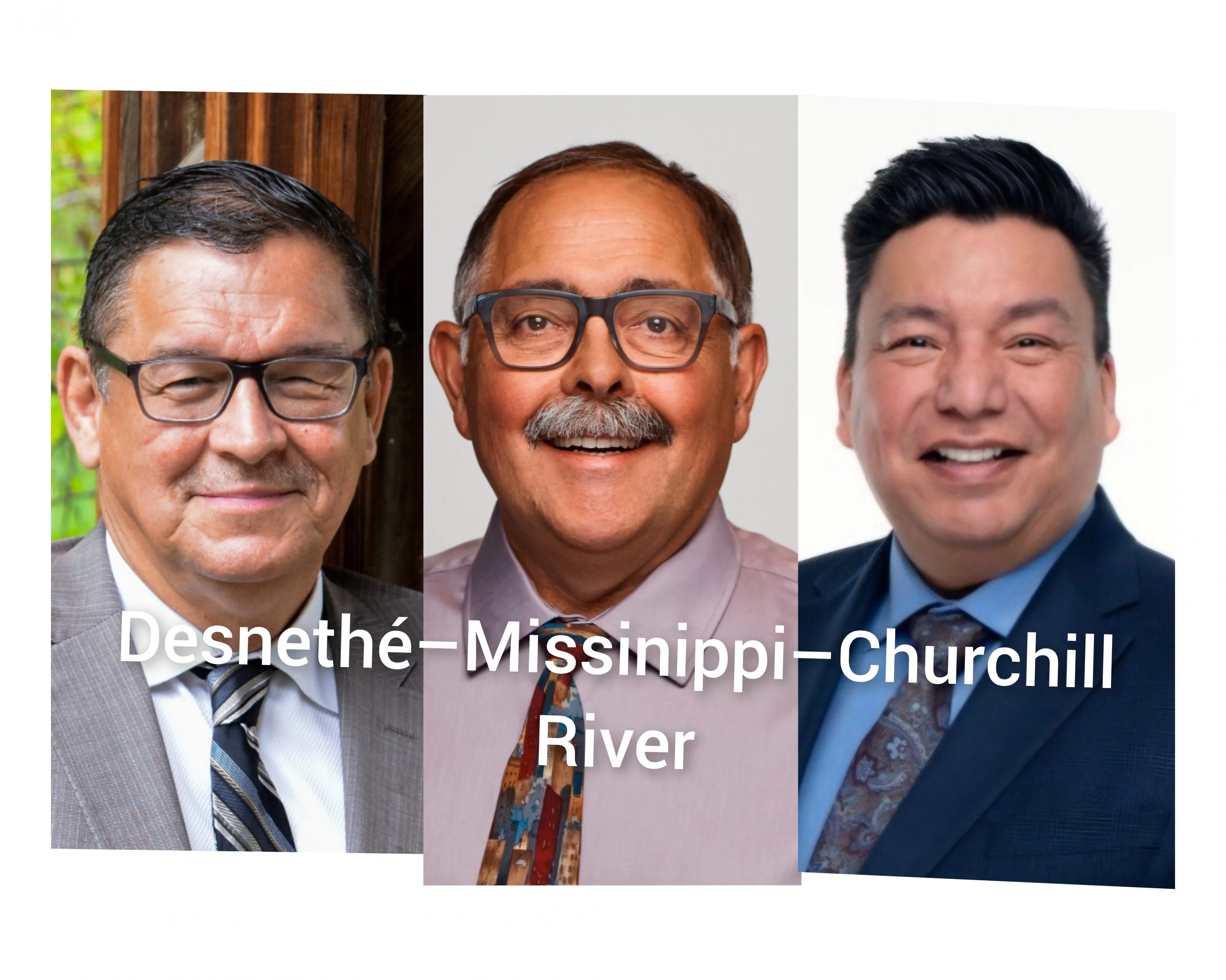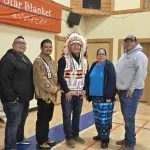
Q and A with Desnethé-Missinippe-Churchill River candidates
Monday’s federal has an electoral district the: Desnethé-Missinippe-Churchill River where Indigenous people can decide the outcome. It is the third largest federal riding in Canada, spanning the entire northern region of the province where more than 70 per cent of the population is Indigenous.
Three Indigenous politicians want to be the Member of Parliament (MP) to represent the region’s people: Buckley Belanger, (Liberal), Jim Lemaigre (Conservative), and Doug Racine (New Democrat). The seat was held by Conservative MP Gary Vidal who is not seeking re-election.
Belanger, Métis, has served as the Member of Legislative Assembly (MLA) in Saskatchewan for the Athabasca constituency as a member of the New Democrats, and is currently the Mayor of Île-à-la-Crosse.
Lemaigre, a member of Clearwater River Dene Nation, has also served as MLA for Athabasca as a member of the Saskatchewan Party and is a former RCMP constable.
Racine, Métis, a longtime lawyer and military veteran, has represented organizations at the Nuclear Safety Commission and National Energy Board.
Eagle Feather News spoke reached out to the candidates to get their thoughts on the biggest issues facing Indigenous people in northern Saskatchewan (answers are edited for length).
Why are you running in the federal election?
Belanger (Liberal):
Since becoming Mayor of Île-à-la-Crosse, I’ve noticed as we’ve tried to change the fortunes of our community, there’s not a lot of help from the provincial government and a lot of other organizations that could help us. There’s a bit of frustration setting in, because we really need mental health support and help to deal with the addiction issue. So I decided I might as well re-enter the fray and try to find the answers.
Lemaigre (Conservative):
This is an opportunity for Northern Saskatchewan. I got in as a MLA under the Saskatchewan Party government, and served on behalf of the Athabasca constituency. Now, there’s an opportunity to represent region on a federal level. One of the things that attracted me to the Conservative Party is their language of empowering First Nations.
Racine (NDP):
Over the course of my life, I’ve built a good skillset – 25 years as a lawyer, 12-year military veteran, and represented clients on several national boards, including the Nuclear Safety Commission and National Energy Board. That should really help in the next couple years with all the talk about the energy corridor. I have a good understanding of government and advocating.
What is the biggest issue for Indigenous people in northern Saskatchewan?
Belanger (Liberal):
In northern Saskatchewan there’s 270,000-square kilometres (kms), so for every man, woman, and child, that’s about nine or 10-square kms each. That land is absolutely valuable, we have a lot of resources, not only tourism opportunities and forestry, but minerals, uranium. What I can’t figure out is why aren’t we, as northern Saskatchewan people that live in this land, asserting ourselves in this land, attracting investment, and really starting to rebuild our lives? We can’t simply continue cheerleading the economy as companies extract resources.
We certainly want to move forward in a really unique way for Northern Saskatchewan to finally see the benefits of our land and all the resources within those lands to make a difference in our local communities. We’re tired of waiting for those benefits, we want to be able to go to Ottawa and say ‘we need action now.’
Lemaigre (Conservative):
Addiction services available in communities, and mental health supports. When our people are hurting and dealing with addictions, recovery becomes very important. Communities want to be supported when their community members want to embark on a recovery journey, and from what I hear from a lot of leadership across the province is the lack of support.
Also, the high cost of living. Some fly-in communities talk about how expensive it is to live. And, the lack of opportunities due to some of our communities being so remote. Sometimes the opportunities aren’t there for people to find employment and sustain their families. In Fond du Lac, we heard about how some grade 12 graduates don’t have the opportunity to advance their education. I went back to the provincial government and we announced funding for advanced education right in the community.
Racine (NDP):
The biggest overall issue is housing. A lot of federal programming doesn’t fit the north. There’s also not enough tax dollars coming back to the north. A lot of mineral wealth flows south and never comes back. There’s a real lack of housing, infrastructure, and roads, which has a lot to do with tax dollars not coming back.
The damage that the Natural Resources Transfer Agreement has done to First Nations, Métis, and Indigenous people has to come to an end. When the federal government transferred all the mineral resources to the provinces, (Indigenous people) were not invited to the table. There has to be some sort of revenue resource sharing.
The other issue is drug addiction and not enough treatment centres and services for those suffering from addiction. It’s all interconnected. You have some communities where the drug addiction is so bad that they’re getting kicked out of homes, so they’ve got no shelter.
How do we better engage young people in politics and their communities?
Belanger (Liberal):
I think it’s going to take a lot of education from the grandparents and parents to explain to the children, which I don’t think is happening now. I think we need to re-engage families to teach kids about the differences between a Conservative versus a Liberal – which party has a history of serving our communities.
I think Trump has brought a lot of the Indigenous communities together by threatening to make Canada the 51st state. I think a lot of young people don’t think that’s cool. I think we’re seeing a gelling of some of our values as Canadians and it’s impacting Indigenous communities. They don’t want Donald Trump taking over Canada – they want a fair share in terms of resources in our backyards. So we have to explain to them how it impacts them and why they should get involved in politics.
Lemaigre (Conservative):
There’s some good engagement with high school students. Some teachers are teaching government structures, and they’ve had the opportunity to discuss what it meant for them to be represented federally and provincially.
I was a product of leaders and Elders coming to my community and saying ‘you’re going to be a leader one day, you’re going to represent us’. I grew up in the north. All my education is from the north. It’s believing that you could be part of that system, and having people see the value in what you can give.
In northern Saskatchewan and in some of our communities, statistics are low. I think with young people, if you engage in dialogue with them, encourage them to vote, they well. Young people are very aware of what’s going on through social media (…) there’s a strong presence of opinions of how people see things happen. So we have to be respectful of those opinions, engage in dialogue, and encourage people to engage in the democratic process.
Racine (NDP):
There has to be special teams to do outreach, where you put a team together and visit communities, and engage with the young people. Get them to understand why it’s so important. One community I visited (…) people there told you, we don’t vote at all. It’s a crisis. Some communities tell you they don’t even vote for Chief and council. It’s a grave concern.
I think a part of it has to do with a lack of hope and not seeing anything is getting done. If nothing is getting done then there’s no reason for them to go out and vote. You have to give people hope.
I think what’s been missing for the last 20 years is any type of vision or leadership from the government in power. You have to have a vision of a healthy northern community. You have to set goals to give people hope.

